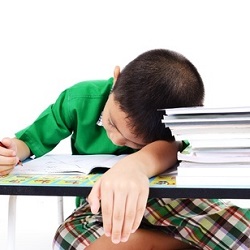The Importance of Not Overscheduling Kids
Kids today are blessed with great opportunities, far reaching chances to participate in a number and variety of activities that previous generations could never have dreamed of. At the same time, this abundance of things to do can lead to the dangerous pitfall of overscheduling. Just because you can do so many things doesn’t mean it is the right thing to do. For ideas about finding a balance, we share a recent article from a prominent psychiatrist for you to consider.
For some time now, it has been easy to find kids with busier schedules than their parents. Between school sports, clubs, art, friends, and any number of other activities – kids can be pushed to the limit. According to Dr. Shimi Kang, the fact that everyone seems to be doing this sort of overscheduling only makes it an easier trap to fall into. In her own words, “I know it doesn’t feel right but everyone else is doing it.”
Besides the trap of “falling in with the crowd,” Dr. Kang describes another possible explanation for the way she slid into overscheduling despite knowing better. As a fifth child with immigrant parents who worked hard to barely support the family, Dr. Kang describes her own childhood as one without “a single structured activity.” All the opportunities that she was never able to participate in as a child were too appealing to pass up for her own children – even if it meant going overboard.
Even for parents who enjoyed their own rich schedules growing up, new options are constantly being made available to children. Without any intention of doing so, it can be easy to fall into the trap of “I enjoyed French, but why can’t my child study French and Chinese!?” When we want the best for our children’s future, it can feel like we are selling them short if we don’t allow them to take advantage of every club, class, and activity available.
According to Dr. Kang, the problem with overscheduling goes beyond just stressing our kids out. She cites a 2014 study from the Journal Frontiers of Psychology which indicates that too many activities can actually provide an active impediment to the way children grow. This overabundance of structure and scheduling can result in children who can’t adapt and go with the flow. It can affect interpersonal skills and critical thinking. In the end, children need a balance of structured time and unstructured time because real life consists of both. Children need to learn to follow the rules and govern their own time. Existing solely within rigid boundaries delays or interferes with their ability to think for themselves.
This same study stated that the “key identified 21st century skills are creativity, communication, critical thinking, and collaboration.” While some of these skills can be learned within structured activities, many will come from (or at the very least, be aided by) free time in which kids get to be kids, think on their feet, and exist at their own level. By interacting and playing with other kids, making choices about when and how to study, and choosing between options, they learn these key skills much more readily.
When we overschedule our kids we may think that we are just taking advantage of every option available to them, but the fact is that kids need options of their own. Dr. Kang also makes it very clear that the worst cases that have come across her desk, the ones in which kids were stressed or even damaged by overscheduling, came in instances where communication between parents and children was poor. Talk with your children, see what their wants and needs are, and give them time to be kids.













No Comment